HI5015: Legal Aspects of International Trade and Unilever Australia
VerifiedAdded on 2023/01/23
|13
|2884
|95
Report
AI Summary
This report provides an in-depth analysis of the legal framework impacting Unilever Australia. It begins with an executive summary and introduction, then delves into the impact of company tax law, specifically addressing tax avoidance measures and compliance requirements. The report also examines Australian copyright law and its implications for the company. Furthermore, it explores the influence of international agreements, including the Universal Declaration of Human Rights, ILO conventions, and OECD guidelines, on Unilever's operations and labor practices. The role of bilateral tax treaties and their impact on tax avoidance strategies are discussed. Finally, the report analyzes the rights applicable to on-demand markets and how they affect Unilever's international transactions. The report concludes by highlighting the various regulations and how these affect the company's business in Australia.
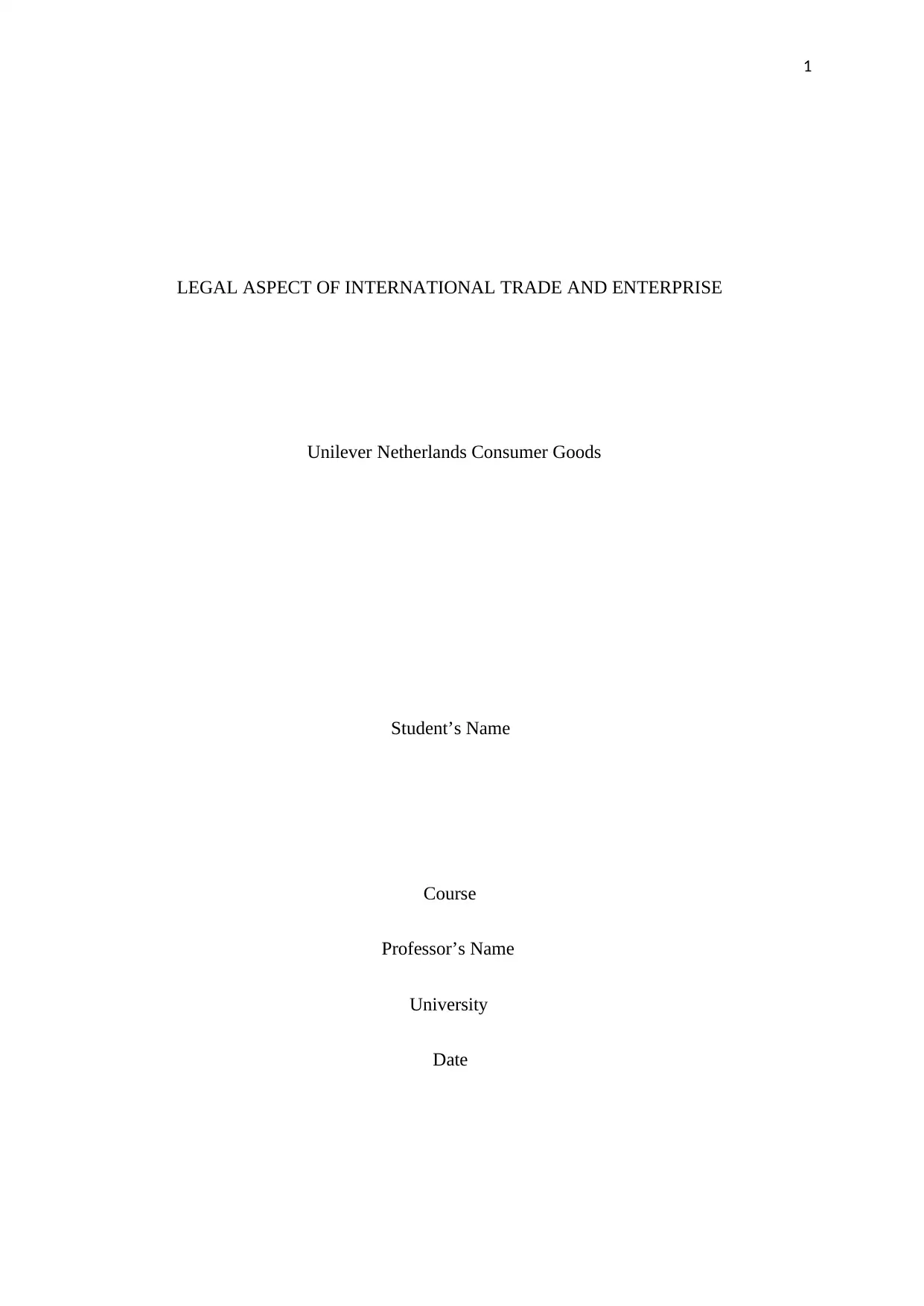
1
LEGAL ASPECT OF INTERNATIONAL TRADE AND ENTERPRISE
Unilever Netherlands Consumer Goods
Student’s Name
Course
Professor’s Name
University
Date
LEGAL ASPECT OF INTERNATIONAL TRADE AND ENTERPRISE
Unilever Netherlands Consumer Goods
Student’s Name
Course
Professor’s Name
University
Date
Paraphrase This Document
Need a fresh take? Get an instant paraphrase of this document with our AI Paraphraser
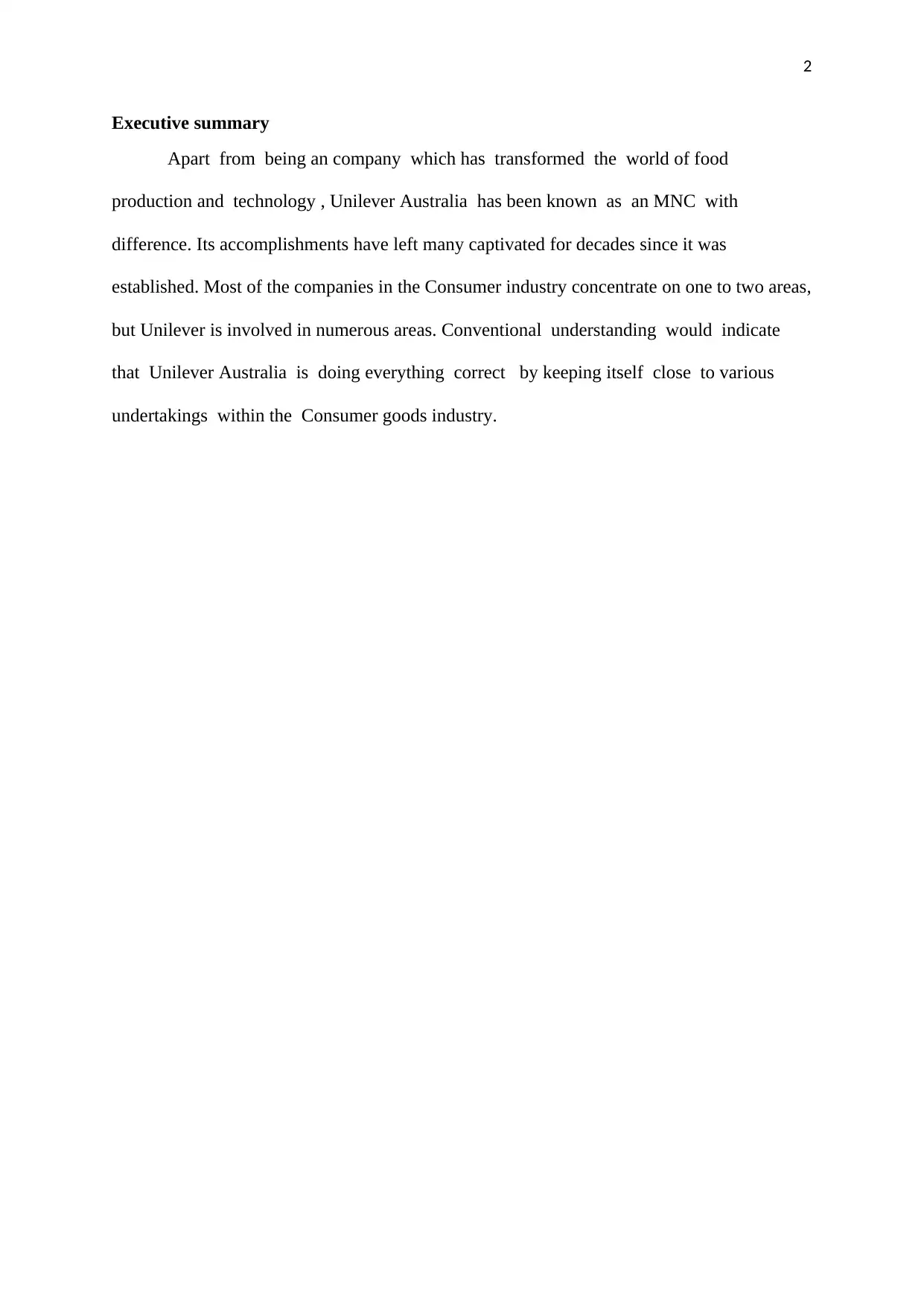
2
Executive summary
Apart from being an company which has transformed the world of food
production and technology , Unilever Australia has been known as an MNC with
difference. Its accomplishments have left many captivated for decades since it was
established. Most of the companies in the Consumer industry concentrate on one to two areas,
but Unilever is involved in numerous areas. Conventional understanding would indicate
that Unilever Australia is doing everything correct by keeping itself close to various
undertakings within the Consumer goods industry.
Executive summary
Apart from being an company which has transformed the world of food
production and technology , Unilever Australia has been known as an MNC with
difference. Its accomplishments have left many captivated for decades since it was
established. Most of the companies in the Consumer industry concentrate on one to two areas,
but Unilever is involved in numerous areas. Conventional understanding would indicate
that Unilever Australia is doing everything correct by keeping itself close to various
undertakings within the Consumer goods industry.
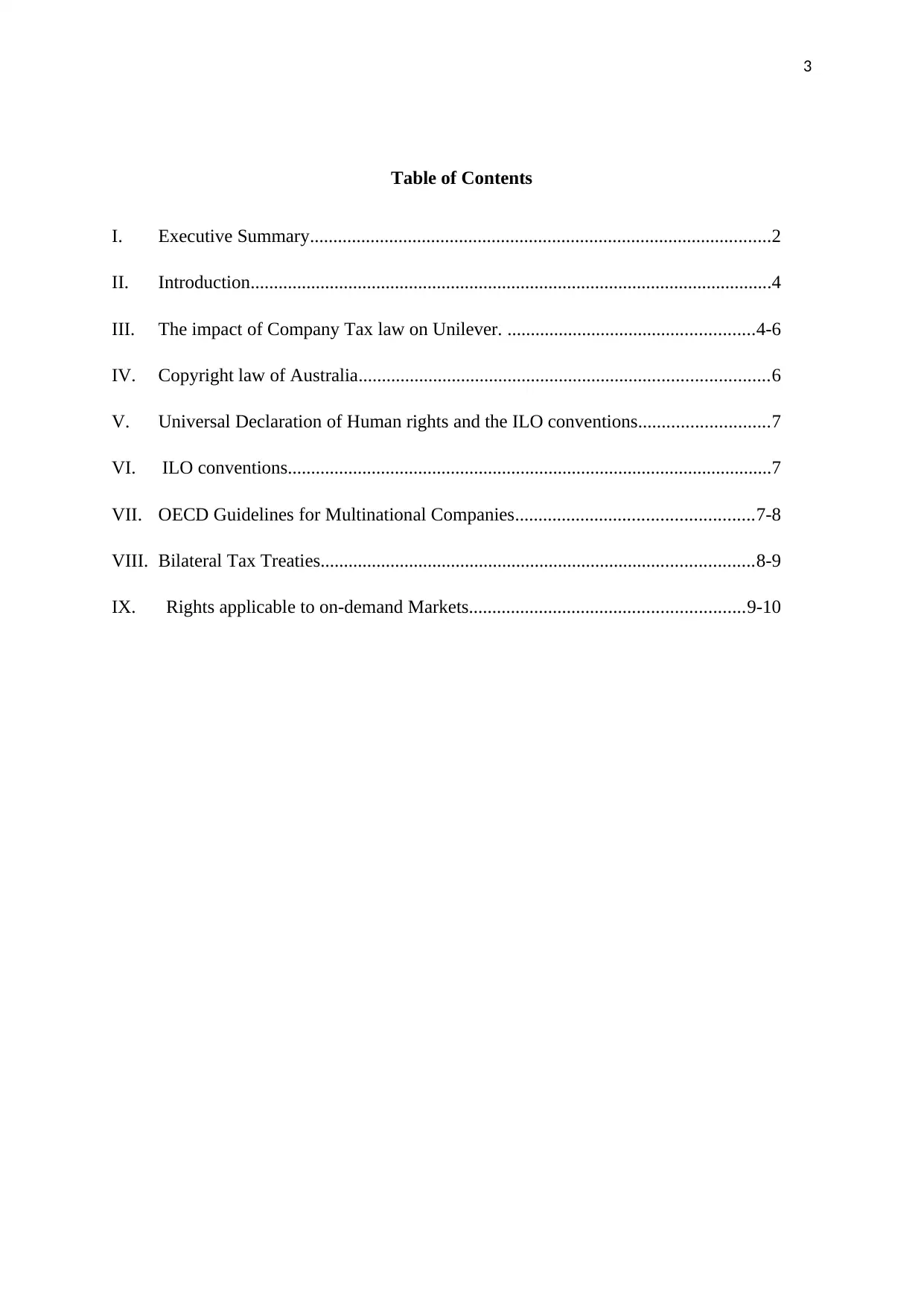
3
Table of Contents
I. Executive Summary...................................................................................................2
II. Introduction................................................................................................................4
III. The impact of Company Tax law on Unilever. .....................................................4-6
IV. Copyright law of Australia........................................................................................6
V. Universal Declaration of Human rights and the ILO conventions............................7
VI. ILO conventions........................................................................................................7
VII. OECD Guidelines for Multinational Companies...................................................7-8
VIII. Bilateral Tax Treaties.............................................................................................8-9
IX. Rights applicable to on-demand Markets...........................................................9-10
Table of Contents
I. Executive Summary...................................................................................................2
II. Introduction................................................................................................................4
III. The impact of Company Tax law on Unilever. .....................................................4-6
IV. Copyright law of Australia........................................................................................6
V. Universal Declaration of Human rights and the ILO conventions............................7
VI. ILO conventions........................................................................................................7
VII. OECD Guidelines for Multinational Companies...................................................7-8
VIII. Bilateral Tax Treaties.............................................................................................8-9
IX. Rights applicable to on-demand Markets...........................................................9-10
⊘ This is a preview!⊘
Do you want full access?
Subscribe today to unlock all pages.

Trusted by 1+ million students worldwide
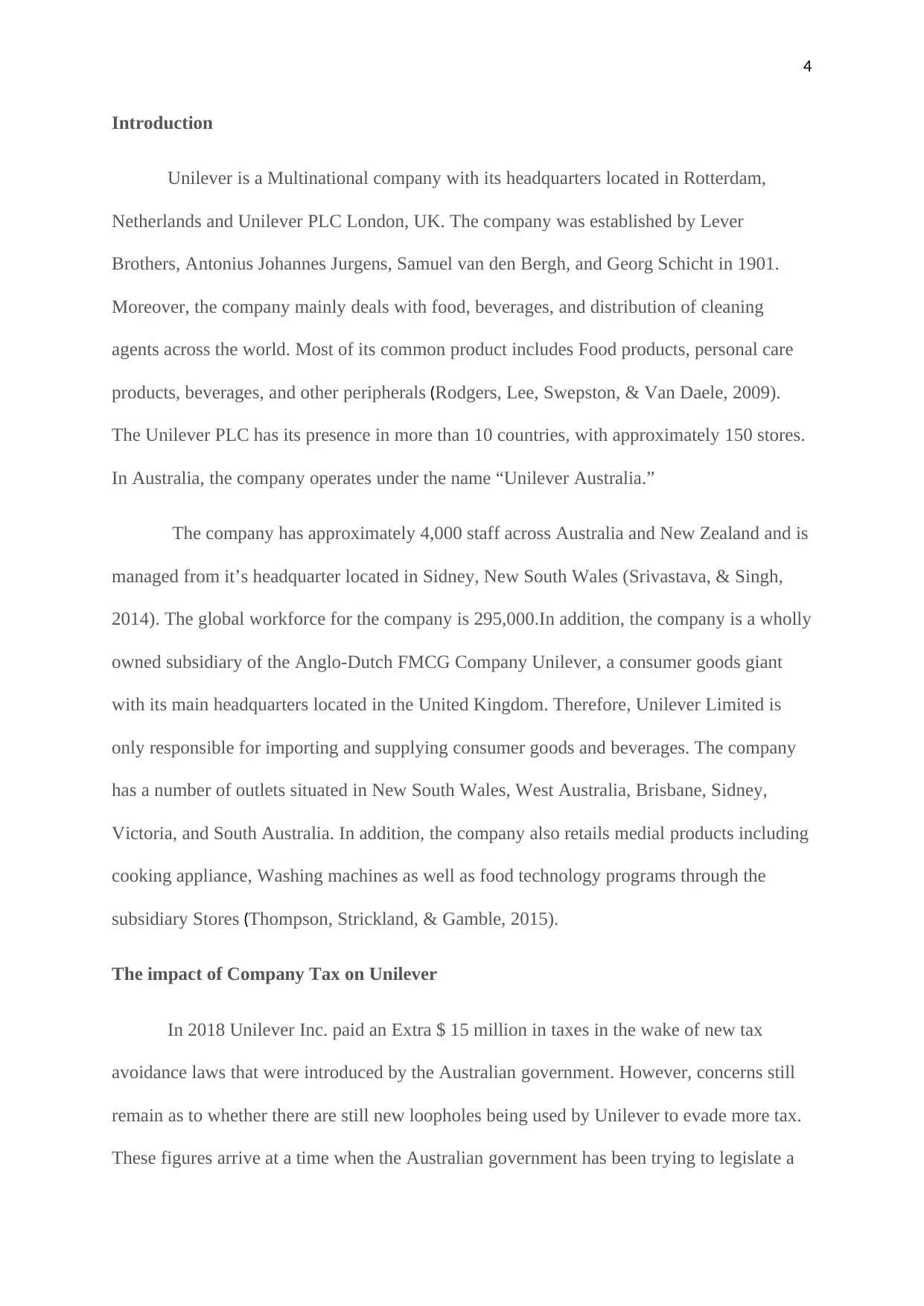
4
Introduction
Unilever is a Multinational company with its headquarters located in Rotterdam,
Netherlands and Unilever PLC London, UK. The company was established by Lever
Brothers, Antonius Johannes Jurgens, Samuel van den Bergh, and Georg Schicht in 1901.
Moreover, the company mainly deals with food, beverages, and distribution of cleaning
agents across the world. Most of its common product includes Food products, personal care
products, beverages, and other peripherals (Rodgers, Lee, Swepston, & Van Daele, 2009).
The Unilever PLC has its presence in more than 10 countries, with approximately 150 stores.
In Australia, the company operates under the name “Unilever Australia.”
The company has approximately 4,000 staff across Australia and New Zealand and is
managed from it’s headquarter located in Sidney, New South Wales (Srivastava, & Singh,
2014). The global workforce for the company is 295,000.In addition, the company is a wholly
owned subsidiary of the Anglo-Dutch FMCG Company Unilever, a consumer goods giant
with its main headquarters located in the United Kingdom. Therefore, Unilever Limited is
only responsible for importing and supplying consumer goods and beverages. The company
has a number of outlets situated in New South Wales, West Australia, Brisbane, Sidney,
Victoria, and South Australia. In addition, the company also retails medial products including
cooking appliance, Washing machines as well as food technology programs through the
subsidiary Stores (Thompson, Strickland, & Gamble, 2015).
The impact of Company Tax on Unilever
In 2018 Unilever Inc. paid an Extra $ 15 million in taxes in the wake of new tax
avoidance laws that were introduced by the Australian government. However, concerns still
remain as to whether there are still new loopholes being used by Unilever to evade more tax.
These figures arrive at a time when the Australian government has been trying to legislate a
Introduction
Unilever is a Multinational company with its headquarters located in Rotterdam,
Netherlands and Unilever PLC London, UK. The company was established by Lever
Brothers, Antonius Johannes Jurgens, Samuel van den Bergh, and Georg Schicht in 1901.
Moreover, the company mainly deals with food, beverages, and distribution of cleaning
agents across the world. Most of its common product includes Food products, personal care
products, beverages, and other peripherals (Rodgers, Lee, Swepston, & Van Daele, 2009).
The Unilever PLC has its presence in more than 10 countries, with approximately 150 stores.
In Australia, the company operates under the name “Unilever Australia.”
The company has approximately 4,000 staff across Australia and New Zealand and is
managed from it’s headquarter located in Sidney, New South Wales (Srivastava, & Singh,
2014). The global workforce for the company is 295,000.In addition, the company is a wholly
owned subsidiary of the Anglo-Dutch FMCG Company Unilever, a consumer goods giant
with its main headquarters located in the United Kingdom. Therefore, Unilever Limited is
only responsible for importing and supplying consumer goods and beverages. The company
has a number of outlets situated in New South Wales, West Australia, Brisbane, Sidney,
Victoria, and South Australia. In addition, the company also retails medial products including
cooking appliance, Washing machines as well as food technology programs through the
subsidiary Stores (Thompson, Strickland, & Gamble, 2015).
The impact of Company Tax on Unilever
In 2018 Unilever Inc. paid an Extra $ 15 million in taxes in the wake of new tax
avoidance laws that were introduced by the Australian government. However, concerns still
remain as to whether there are still new loopholes being used by Unilever to evade more tax.
These figures arrive at a time when the Australian government has been trying to legislate a
Paraphrase This Document
Need a fresh take? Get an instant paraphrase of this document with our AI Paraphraser
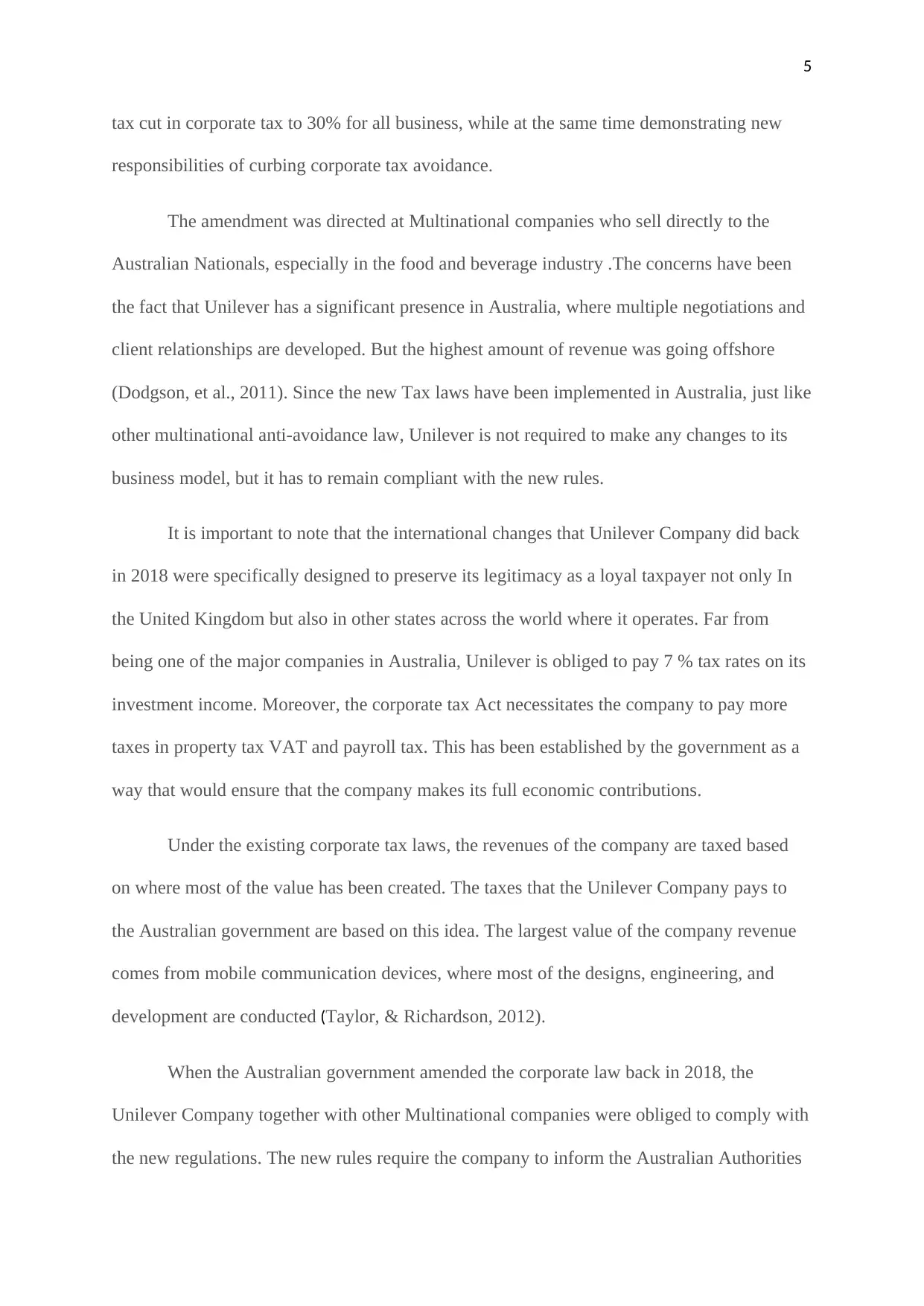
5
tax cut in corporate tax to 30% for all business, while at the same time demonstrating new
responsibilities of curbing corporate tax avoidance.
The amendment was directed at Multinational companies who sell directly to the
Australian Nationals, especially in the food and beverage industry .The concerns have been
the fact that Unilever has a significant presence in Australia, where multiple negotiations and
client relationships are developed. But the highest amount of revenue was going offshore
(Dodgson, et al., 2011). Since the new Tax laws have been implemented in Australia, just like
other multinational anti-avoidance law, Unilever is not required to make any changes to its
business model, but it has to remain compliant with the new rules.
It is important to note that the international changes that Unilever Company did back
in 2018 were specifically designed to preserve its legitimacy as a loyal taxpayer not only In
the United Kingdom but also in other states across the world where it operates. Far from
being one of the major companies in Australia, Unilever is obliged to pay 7 % tax rates on its
investment income. Moreover, the corporate tax Act necessitates the company to pay more
taxes in property tax VAT and payroll tax. This has been established by the government as a
way that would ensure that the company makes its full economic contributions.
Under the existing corporate tax laws, the revenues of the company are taxed based
on where most of the value has been created. The taxes that the Unilever Company pays to
the Australian government are based on this idea. The largest value of the company revenue
comes from mobile communication devices, where most of the designs, engineering, and
development are conducted (Taylor, & Richardson, 2012).
When the Australian government amended the corporate law back in 2018, the
Unilever Company together with other Multinational companies were obliged to comply with
the new regulations. The new rules require the company to inform the Australian Authorities
tax cut in corporate tax to 30% for all business, while at the same time demonstrating new
responsibilities of curbing corporate tax avoidance.
The amendment was directed at Multinational companies who sell directly to the
Australian Nationals, especially in the food and beverage industry .The concerns have been
the fact that Unilever has a significant presence in Australia, where multiple negotiations and
client relationships are developed. But the highest amount of revenue was going offshore
(Dodgson, et al., 2011). Since the new Tax laws have been implemented in Australia, just like
other multinational anti-avoidance law, Unilever is not required to make any changes to its
business model, but it has to remain compliant with the new rules.
It is important to note that the international changes that Unilever Company did back
in 2018 were specifically designed to preserve its legitimacy as a loyal taxpayer not only In
the United Kingdom but also in other states across the world where it operates. Far from
being one of the major companies in Australia, Unilever is obliged to pay 7 % tax rates on its
investment income. Moreover, the corporate tax Act necessitates the company to pay more
taxes in property tax VAT and payroll tax. This has been established by the government as a
way that would ensure that the company makes its full economic contributions.
Under the existing corporate tax laws, the revenues of the company are taxed based
on where most of the value has been created. The taxes that the Unilever Company pays to
the Australian government are based on this idea. The largest value of the company revenue
comes from mobile communication devices, where most of the designs, engineering, and
development are conducted (Taylor, & Richardson, 2012).
When the Australian government amended the corporate law back in 2018, the
Unilever Company together with other Multinational companies were obliged to comply with
the new regulations. The new rules require the company to inform the Australian Authorities
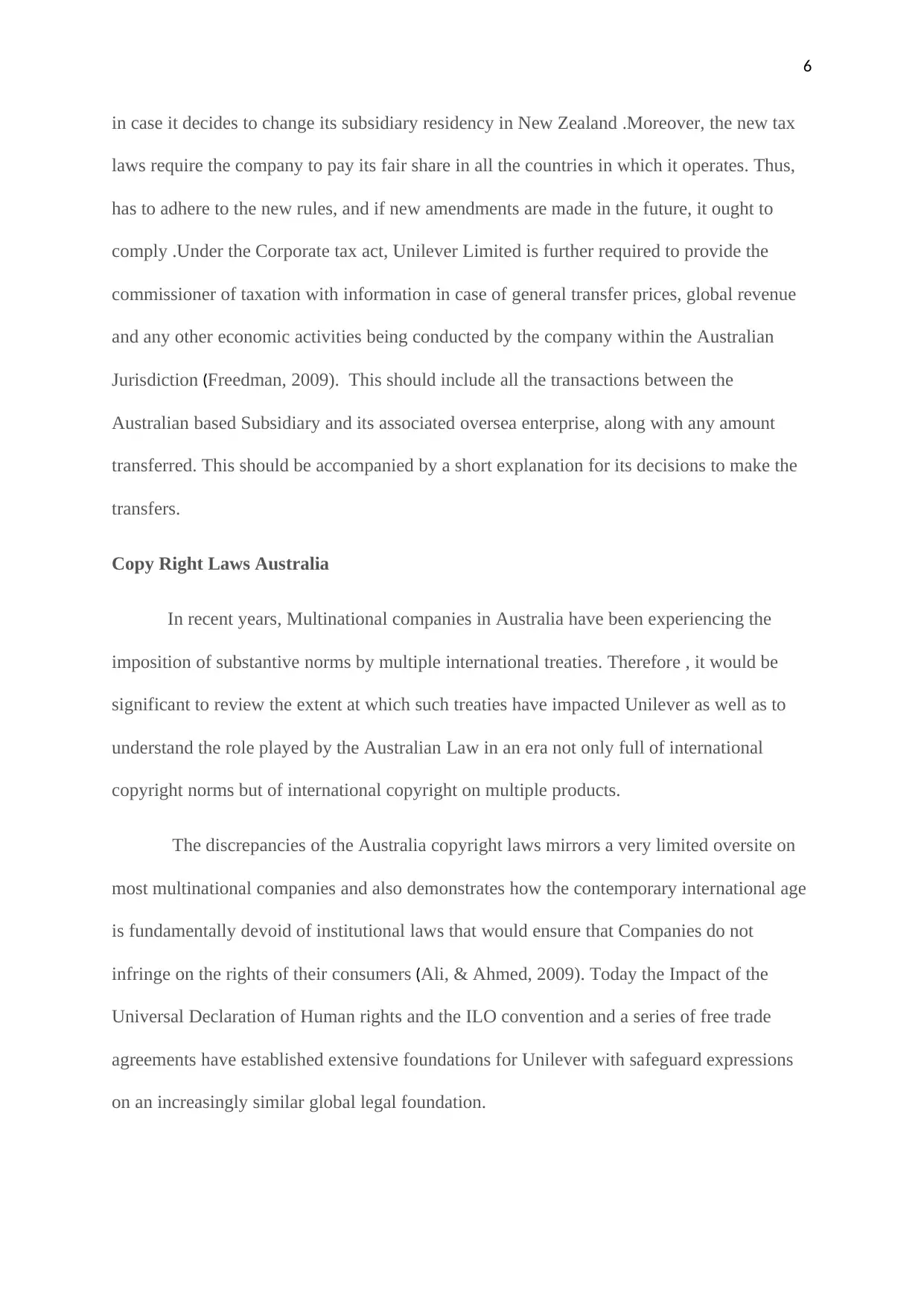
6
in case it decides to change its subsidiary residency in New Zealand .Moreover, the new tax
laws require the company to pay its fair share in all the countries in which it operates. Thus,
has to adhere to the new rules, and if new amendments are made in the future, it ought to
comply .Under the Corporate tax act, Unilever Limited is further required to provide the
commissioner of taxation with information in case of general transfer prices, global revenue
and any other economic activities being conducted by the company within the Australian
Jurisdiction (Freedman, 2009). This should include all the transactions between the
Australian based Subsidiary and its associated oversea enterprise, along with any amount
transferred. This should be accompanied by a short explanation for its decisions to make the
transfers.
Copy Right Laws Australia
In recent years, Multinational companies in Australia have been experiencing the
imposition of substantive norms by multiple international treaties. Therefore , it would be
significant to review the extent at which such treaties have impacted Unilever as well as to
understand the role played by the Australian Law in an era not only full of international
copyright norms but of international copyright on multiple products.
The discrepancies of the Australia copyright laws mirrors a very limited oversite on
most multinational companies and also demonstrates how the contemporary international age
is fundamentally devoid of institutional laws that would ensure that Companies do not
infringe on the rights of their consumers (Ali, & Ahmed, 2009). Today the Impact of the
Universal Declaration of Human rights and the ILO convention and a series of free trade
agreements have established extensive foundations for Unilever with safeguard expressions
on an increasingly similar global legal foundation.
in case it decides to change its subsidiary residency in New Zealand .Moreover, the new tax
laws require the company to pay its fair share in all the countries in which it operates. Thus,
has to adhere to the new rules, and if new amendments are made in the future, it ought to
comply .Under the Corporate tax act, Unilever Limited is further required to provide the
commissioner of taxation with information in case of general transfer prices, global revenue
and any other economic activities being conducted by the company within the Australian
Jurisdiction (Freedman, 2009). This should include all the transactions between the
Australian based Subsidiary and its associated oversea enterprise, along with any amount
transferred. This should be accompanied by a short explanation for its decisions to make the
transfers.
Copy Right Laws Australia
In recent years, Multinational companies in Australia have been experiencing the
imposition of substantive norms by multiple international treaties. Therefore , it would be
significant to review the extent at which such treaties have impacted Unilever as well as to
understand the role played by the Australian Law in an era not only full of international
copyright norms but of international copyright on multiple products.
The discrepancies of the Australia copyright laws mirrors a very limited oversite on
most multinational companies and also demonstrates how the contemporary international age
is fundamentally devoid of institutional laws that would ensure that Companies do not
infringe on the rights of their consumers (Ali, & Ahmed, 2009). Today the Impact of the
Universal Declaration of Human rights and the ILO convention and a series of free trade
agreements have established extensive foundations for Unilever with safeguard expressions
on an increasingly similar global legal foundation.
⊘ This is a preview!⊘
Do you want full access?
Subscribe today to unlock all pages.

Trusted by 1+ million students worldwide
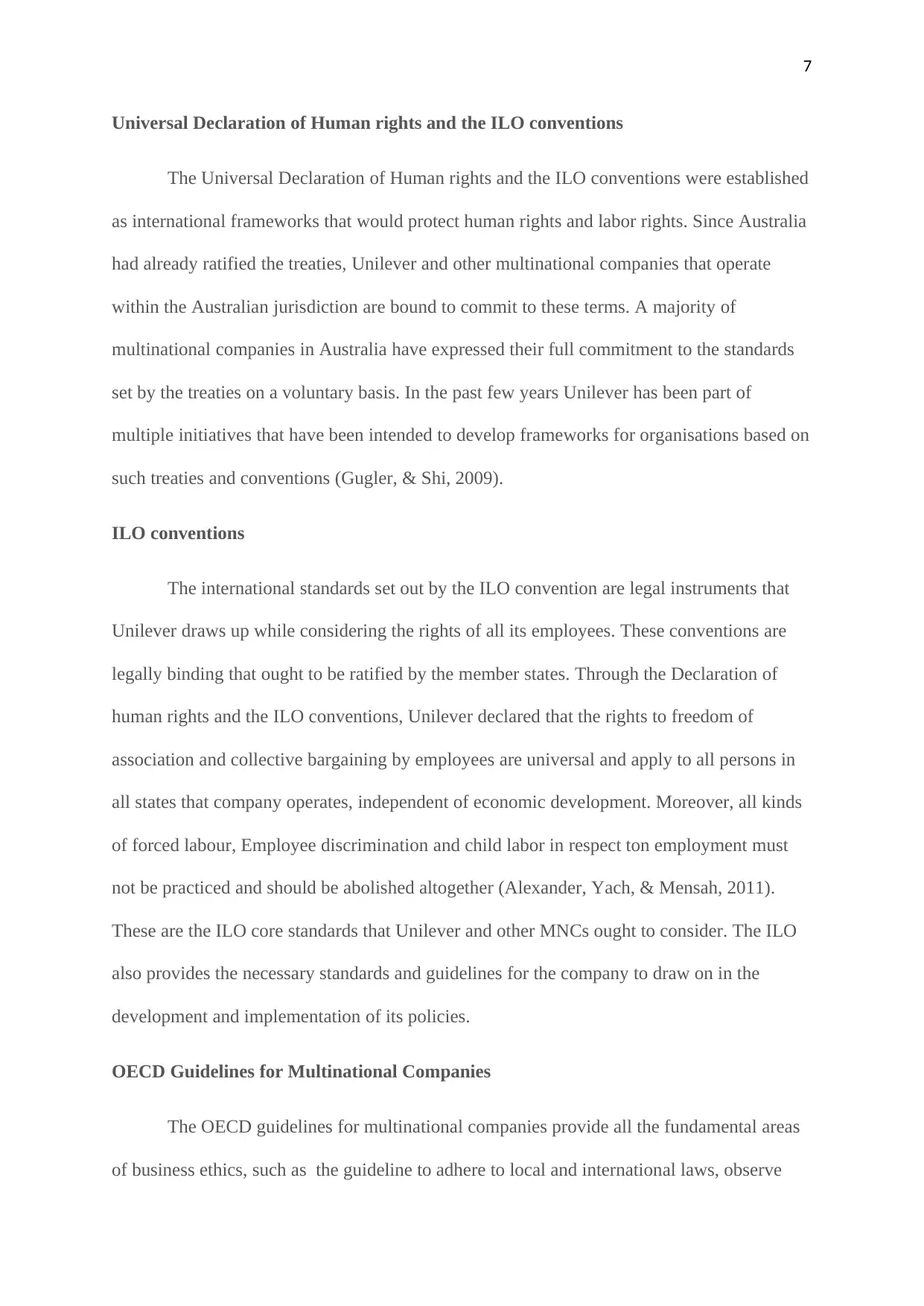
7
Universal Declaration of Human rights and the ILO conventions
The Universal Declaration of Human rights and the ILO conventions were established
as international frameworks that would protect human rights and labor rights. Since Australia
had already ratified the treaties, Unilever and other multinational companies that operate
within the Australian jurisdiction are bound to commit to these terms. A majority of
multinational companies in Australia have expressed their full commitment to the standards
set by the treaties on a voluntary basis. In the past few years Unilever has been part of
multiple initiatives that have been intended to develop frameworks for organisations based on
such treaties and conventions (Gugler, & Shi, 2009).
ILO conventions
The international standards set out by the ILO convention are legal instruments that
Unilever draws up while considering the rights of all its employees. These conventions are
legally binding that ought to be ratified by the member states. Through the Declaration of
human rights and the ILO conventions, Unilever declared that the rights to freedom of
association and collective bargaining by employees are universal and apply to all persons in
all states that company operates, independent of economic development. Moreover, all kinds
of forced labour, Employee discrimination and child labor in respect ton employment must
not be practiced and should be abolished altogether (Alexander, Yach, & Mensah, 2011).
These are the ILO core standards that Unilever and other MNCs ought to consider. The ILO
also provides the necessary standards and guidelines for the company to draw on in the
development and implementation of its policies.
OECD Guidelines for Multinational Companies
The OECD guidelines for multinational companies provide all the fundamental areas
of business ethics, such as the guideline to adhere to local and international laws, observe
Universal Declaration of Human rights and the ILO conventions
The Universal Declaration of Human rights and the ILO conventions were established
as international frameworks that would protect human rights and labor rights. Since Australia
had already ratified the treaties, Unilever and other multinational companies that operate
within the Australian jurisdiction are bound to commit to these terms. A majority of
multinational companies in Australia have expressed their full commitment to the standards
set by the treaties on a voluntary basis. In the past few years Unilever has been part of
multiple initiatives that have been intended to develop frameworks for organisations based on
such treaties and conventions (Gugler, & Shi, 2009).
ILO conventions
The international standards set out by the ILO convention are legal instruments that
Unilever draws up while considering the rights of all its employees. These conventions are
legally binding that ought to be ratified by the member states. Through the Declaration of
human rights and the ILO conventions, Unilever declared that the rights to freedom of
association and collective bargaining by employees are universal and apply to all persons in
all states that company operates, independent of economic development. Moreover, all kinds
of forced labour, Employee discrimination and child labor in respect ton employment must
not be practiced and should be abolished altogether (Alexander, Yach, & Mensah, 2011).
These are the ILO core standards that Unilever and other MNCs ought to consider. The ILO
also provides the necessary standards and guidelines for the company to draw on in the
development and implementation of its policies.
OECD Guidelines for Multinational Companies
The OECD guidelines for multinational companies provide all the fundamental areas
of business ethics, such as the guideline to adhere to local and international laws, observe
Paraphrase This Document
Need a fresh take? Get an instant paraphrase of this document with our AI Paraphraser
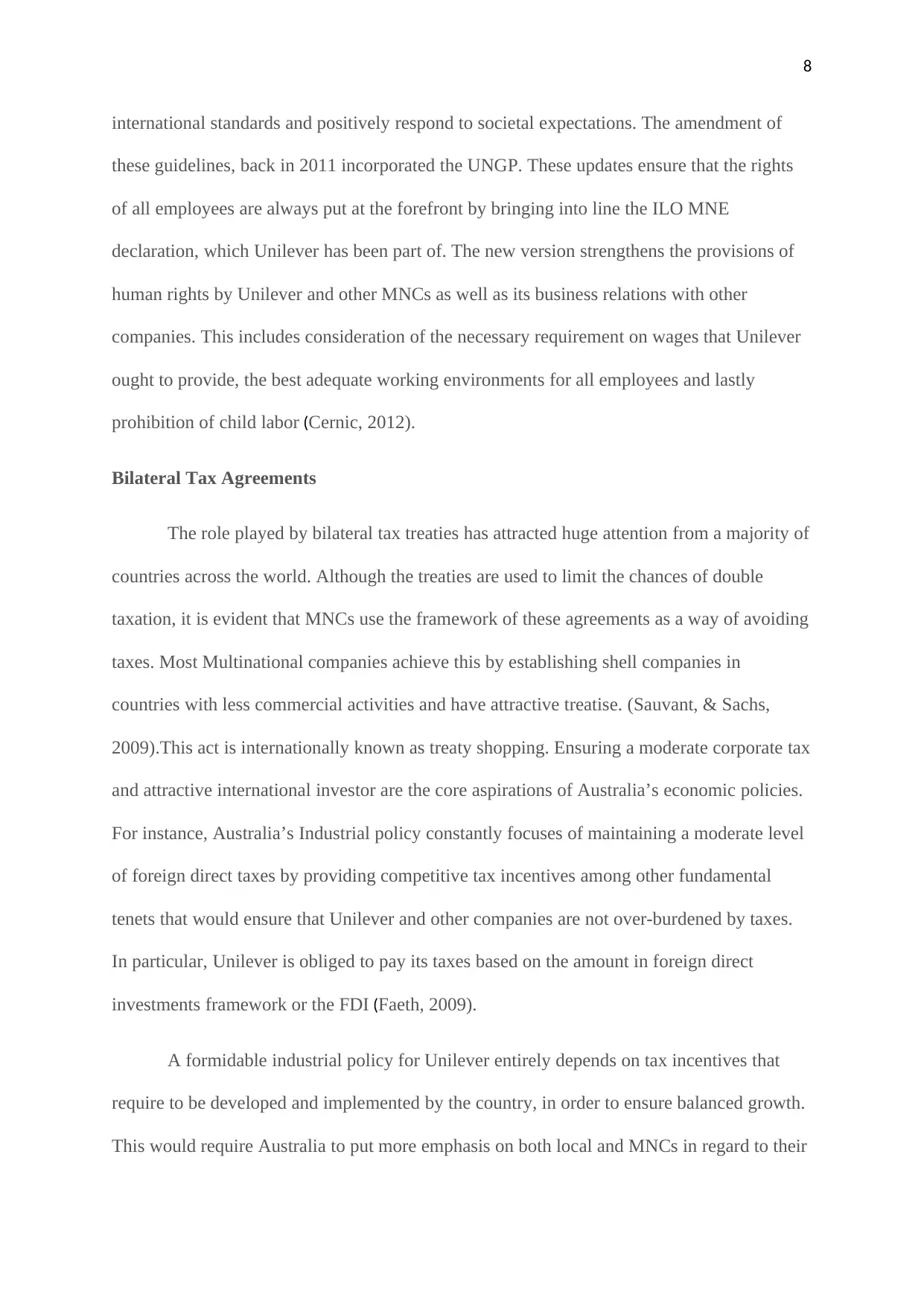
8
international standards and positively respond to societal expectations. The amendment of
these guidelines, back in 2011 incorporated the UNGP. These updates ensure that the rights
of all employees are always put at the forefront by bringing into line the ILO MNE
declaration, which Unilever has been part of. The new version strengthens the provisions of
human rights by Unilever and other MNCs as well as its business relations with other
companies. This includes consideration of the necessary requirement on wages that Unilever
ought to provide, the best adequate working environments for all employees and lastly
prohibition of child labor (Cernic, 2012).
Bilateral Tax Agreements
The role played by bilateral tax treaties has attracted huge attention from a majority of
countries across the world. Although the treaties are used to limit the chances of double
taxation, it is evident that MNCs use the framework of these agreements as a way of avoiding
taxes. Most Multinational companies achieve this by establishing shell companies in
countries with less commercial activities and have attractive treatise. (Sauvant, & Sachs,
2009).This act is internationally known as treaty shopping. Ensuring a moderate corporate tax
and attractive international investor are the core aspirations of Australia’s economic policies.
For instance, Australia’s Industrial policy constantly focuses of maintaining a moderate level
of foreign direct taxes by providing competitive tax incentives among other fundamental
tenets that would ensure that Unilever and other companies are not over-burdened by taxes.
In particular, Unilever is obliged to pay its taxes based on the amount in foreign direct
investments framework or the FDI (Faeth, 2009).
A formidable industrial policy for Unilever entirely depends on tax incentives that
require to be developed and implemented by the country, in order to ensure balanced growth.
This would require Australia to put more emphasis on both local and MNCs in regard to their
international standards and positively respond to societal expectations. The amendment of
these guidelines, back in 2011 incorporated the UNGP. These updates ensure that the rights
of all employees are always put at the forefront by bringing into line the ILO MNE
declaration, which Unilever has been part of. The new version strengthens the provisions of
human rights by Unilever and other MNCs as well as its business relations with other
companies. This includes consideration of the necessary requirement on wages that Unilever
ought to provide, the best adequate working environments for all employees and lastly
prohibition of child labor (Cernic, 2012).
Bilateral Tax Agreements
The role played by bilateral tax treaties has attracted huge attention from a majority of
countries across the world. Although the treaties are used to limit the chances of double
taxation, it is evident that MNCs use the framework of these agreements as a way of avoiding
taxes. Most Multinational companies achieve this by establishing shell companies in
countries with less commercial activities and have attractive treatise. (Sauvant, & Sachs,
2009).This act is internationally known as treaty shopping. Ensuring a moderate corporate tax
and attractive international investor are the core aspirations of Australia’s economic policies.
For instance, Australia’s Industrial policy constantly focuses of maintaining a moderate level
of foreign direct taxes by providing competitive tax incentives among other fundamental
tenets that would ensure that Unilever and other companies are not over-burdened by taxes.
In particular, Unilever is obliged to pay its taxes based on the amount in foreign direct
investments framework or the FDI (Faeth, 2009).
A formidable industrial policy for Unilever entirely depends on tax incentives that
require to be developed and implemented by the country, in order to ensure balanced growth.
This would require Australia to put more emphasis on both local and MNCs in regard to their
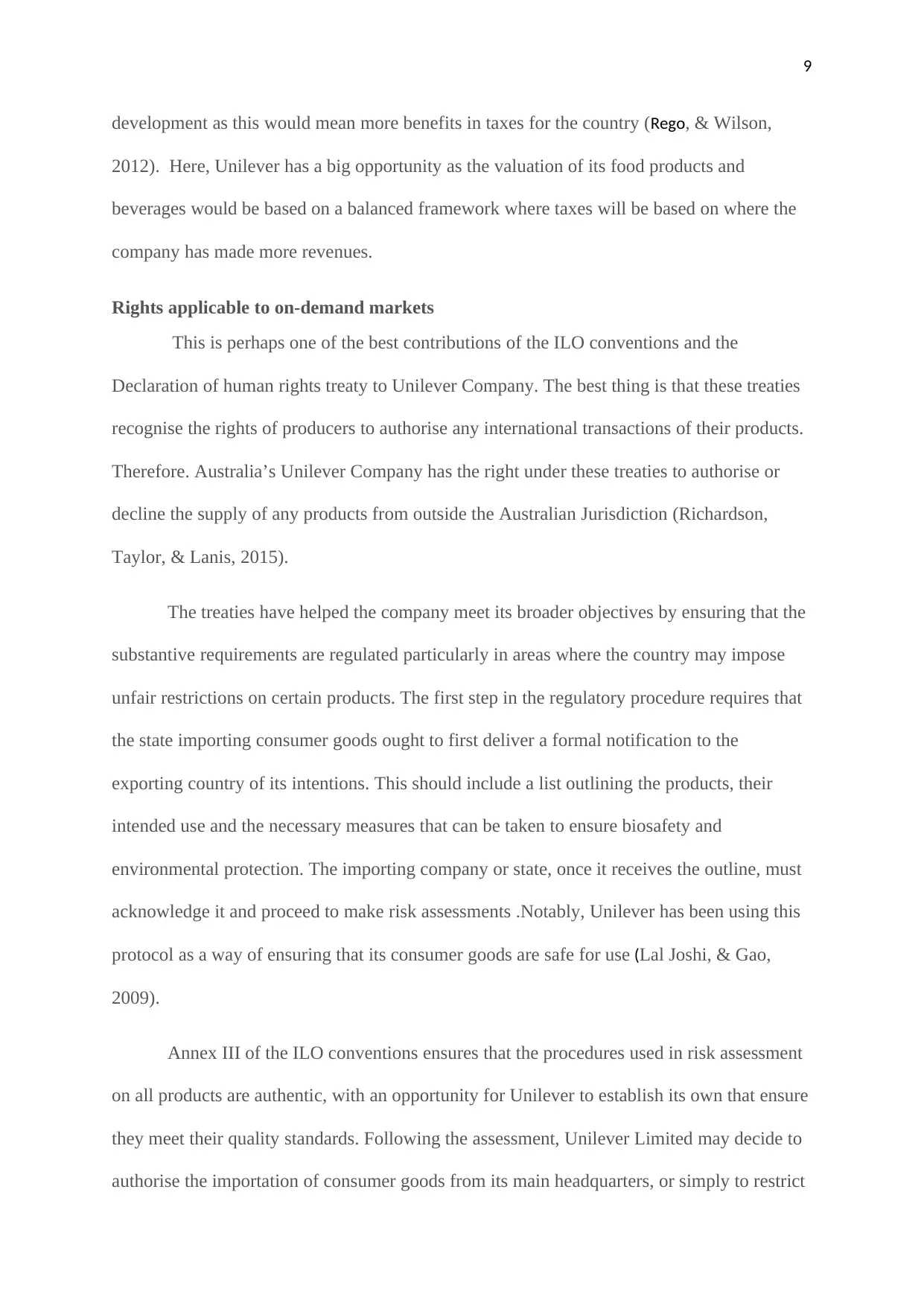
9
development as this would mean more benefits in taxes for the country (Rego, & Wilson,
2012). Here, Unilever has a big opportunity as the valuation of its food products and
beverages would be based on a balanced framework where taxes will be based on where the
company has made more revenues.
Rights applicable to on-demand markets
This is perhaps one of the best contributions of the ILO conventions and the
Declaration of human rights treaty to Unilever Company. The best thing is that these treaties
recognise the rights of producers to authorise any international transactions of their products.
Therefore. Australia’s Unilever Company has the right under these treaties to authorise or
decline the supply of any products from outside the Australian Jurisdiction (Richardson,
Taylor, & Lanis, 2015).
The treaties have helped the company meet its broader objectives by ensuring that the
substantive requirements are regulated particularly in areas where the country may impose
unfair restrictions on certain products. The first step in the regulatory procedure requires that
the state importing consumer goods ought to first deliver a formal notification to the
exporting country of its intentions. This should include a list outlining the products, their
intended use and the necessary measures that can be taken to ensure biosafety and
environmental protection. The importing company or state, once it receives the outline, must
acknowledge it and proceed to make risk assessments .Notably, Unilever has been using this
protocol as a way of ensuring that its consumer goods are safe for use (Lal Joshi, & Gao,
2009).
Annex III of the ILO conventions ensures that the procedures used in risk assessment
on all products are authentic, with an opportunity for Unilever to establish its own that ensure
they meet their quality standards. Following the assessment, Unilever Limited may decide to
authorise the importation of consumer goods from its main headquarters, or simply to restrict
development as this would mean more benefits in taxes for the country (Rego, & Wilson,
2012). Here, Unilever has a big opportunity as the valuation of its food products and
beverages would be based on a balanced framework where taxes will be based on where the
company has made more revenues.
Rights applicable to on-demand markets
This is perhaps one of the best contributions of the ILO conventions and the
Declaration of human rights treaty to Unilever Company. The best thing is that these treaties
recognise the rights of producers to authorise any international transactions of their products.
Therefore. Australia’s Unilever Company has the right under these treaties to authorise or
decline the supply of any products from outside the Australian Jurisdiction (Richardson,
Taylor, & Lanis, 2015).
The treaties have helped the company meet its broader objectives by ensuring that the
substantive requirements are regulated particularly in areas where the country may impose
unfair restrictions on certain products. The first step in the regulatory procedure requires that
the state importing consumer goods ought to first deliver a formal notification to the
exporting country of its intentions. This should include a list outlining the products, their
intended use and the necessary measures that can be taken to ensure biosafety and
environmental protection. The importing company or state, once it receives the outline, must
acknowledge it and proceed to make risk assessments .Notably, Unilever has been using this
protocol as a way of ensuring that its consumer goods are safe for use (Lal Joshi, & Gao,
2009).
Annex III of the ILO conventions ensures that the procedures used in risk assessment
on all products are authentic, with an opportunity for Unilever to establish its own that ensure
they meet their quality standards. Following the assessment, Unilever Limited may decide to
authorise the importation of consumer goods from its main headquarters, or simply to restrict
⊘ This is a preview!⊘
Do you want full access?
Subscribe today to unlock all pages.

Trusted by 1+ million students worldwide
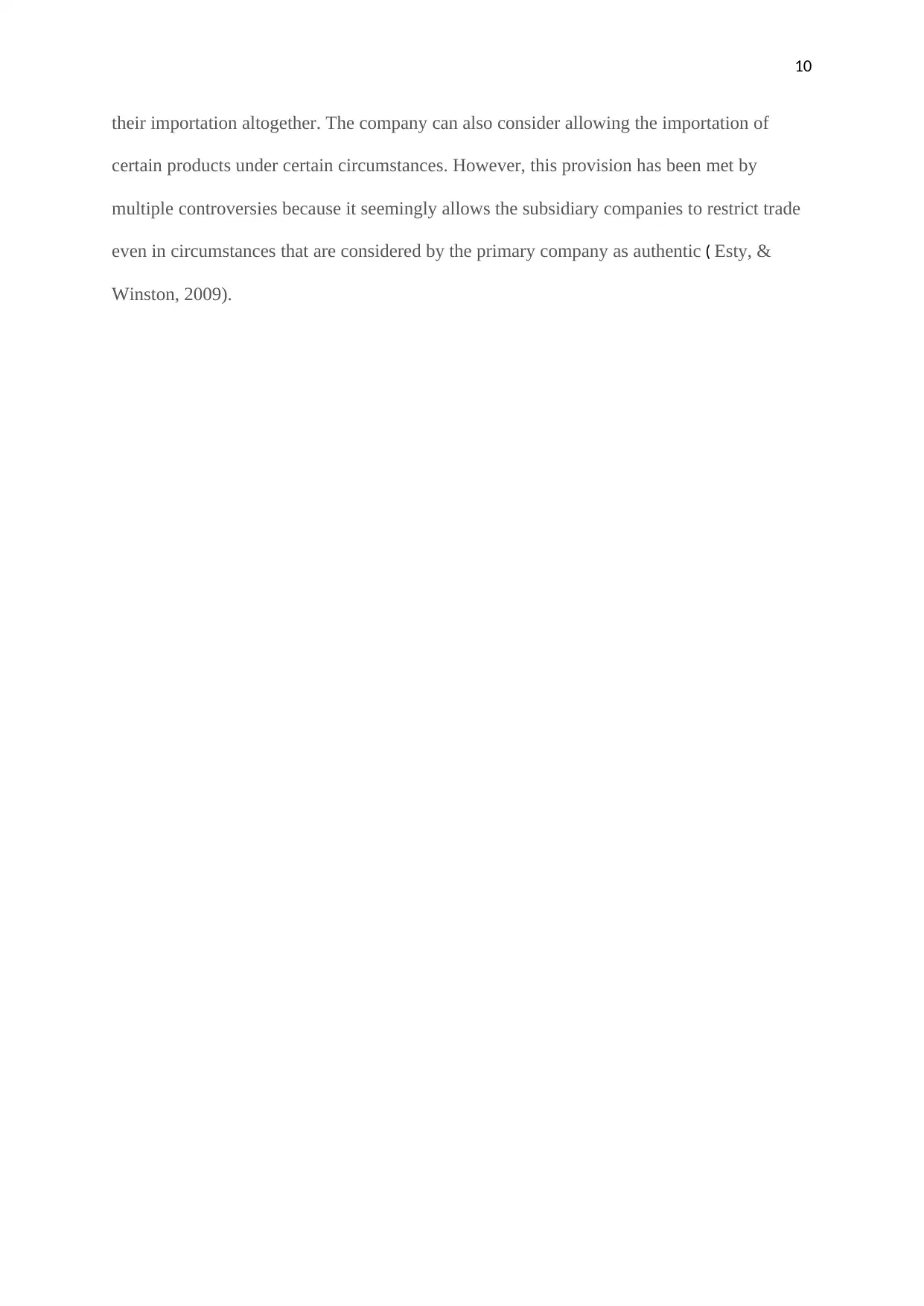
10
their importation altogether. The company can also consider allowing the importation of
certain products under certain circumstances. However, this provision has been met by
multiple controversies because it seemingly allows the subsidiary companies to restrict trade
even in circumstances that are considered by the primary company as authentic ( Esty, &
Winston, 2009).
their importation altogether. The company can also consider allowing the importation of
certain products under certain circumstances. However, this provision has been met by
multiple controversies because it seemingly allows the subsidiary companies to restrict trade
even in circumstances that are considered by the primary company as authentic ( Esty, &
Winston, 2009).
Paraphrase This Document
Need a fresh take? Get an instant paraphrase of this document with our AI Paraphraser
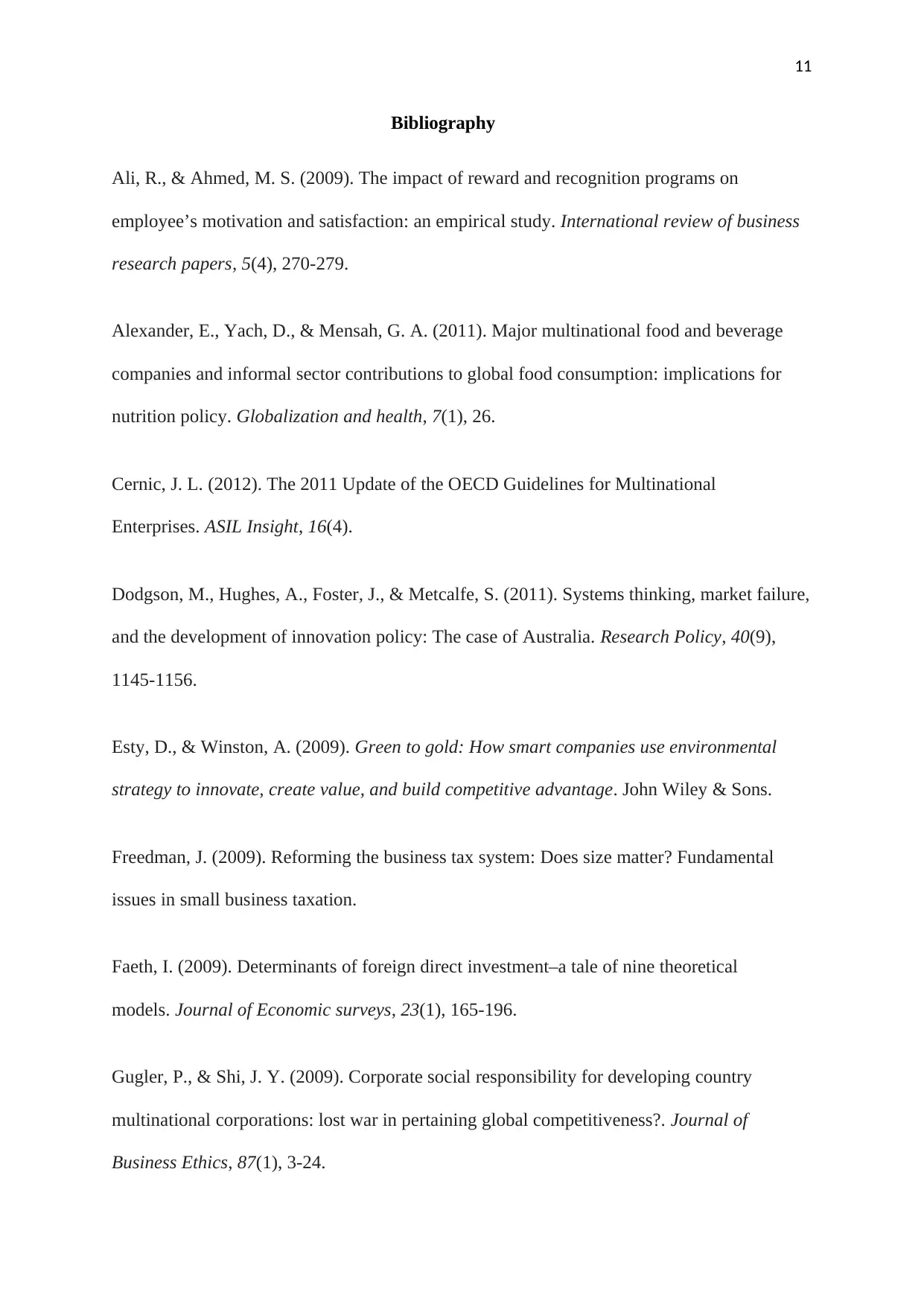
11
Bibliography
Ali, R., & Ahmed, M. S. (2009). The impact of reward and recognition programs on
employee’s motivation and satisfaction: an empirical study. International review of business
research papers, 5(4), 270-279.
Alexander, E., Yach, D., & Mensah, G. A. (2011). Major multinational food and beverage
companies and informal sector contributions to global food consumption: implications for
nutrition policy. Globalization and health, 7(1), 26.
Cernic, J. L. (2012). The 2011 Update of the OECD Guidelines for Multinational
Enterprises. ASIL Insight, 16(4).
Dodgson, M., Hughes, A., Foster, J., & Metcalfe, S. (2011). Systems thinking, market failure,
and the development of innovation policy: The case of Australia. Research Policy, 40(9),
1145-1156.
Esty, D., & Winston, A. (2009). Green to gold: How smart companies use environmental
strategy to innovate, create value, and build competitive advantage. John Wiley & Sons.
Freedman, J. (2009). Reforming the business tax system: Does size matter? Fundamental
issues in small business taxation.
Faeth, I. (2009). Determinants of foreign direct investment–a tale of nine theoretical
models. Journal of Economic surveys, 23(1), 165-196.
Gugler, P., & Shi, J. Y. (2009). Corporate social responsibility for developing country
multinational corporations: lost war in pertaining global competitiveness?. Journal of
Business Ethics, 87(1), 3-24.
Bibliography
Ali, R., & Ahmed, M. S. (2009). The impact of reward and recognition programs on
employee’s motivation and satisfaction: an empirical study. International review of business
research papers, 5(4), 270-279.
Alexander, E., Yach, D., & Mensah, G. A. (2011). Major multinational food and beverage
companies and informal sector contributions to global food consumption: implications for
nutrition policy. Globalization and health, 7(1), 26.
Cernic, J. L. (2012). The 2011 Update of the OECD Guidelines for Multinational
Enterprises. ASIL Insight, 16(4).
Dodgson, M., Hughes, A., Foster, J., & Metcalfe, S. (2011). Systems thinking, market failure,
and the development of innovation policy: The case of Australia. Research Policy, 40(9),
1145-1156.
Esty, D., & Winston, A. (2009). Green to gold: How smart companies use environmental
strategy to innovate, create value, and build competitive advantage. John Wiley & Sons.
Freedman, J. (2009). Reforming the business tax system: Does size matter? Fundamental
issues in small business taxation.
Faeth, I. (2009). Determinants of foreign direct investment–a tale of nine theoretical
models. Journal of Economic surveys, 23(1), 165-196.
Gugler, P., & Shi, J. Y. (2009). Corporate social responsibility for developing country
multinational corporations: lost war in pertaining global competitiveness?. Journal of
Business Ethics, 87(1), 3-24.
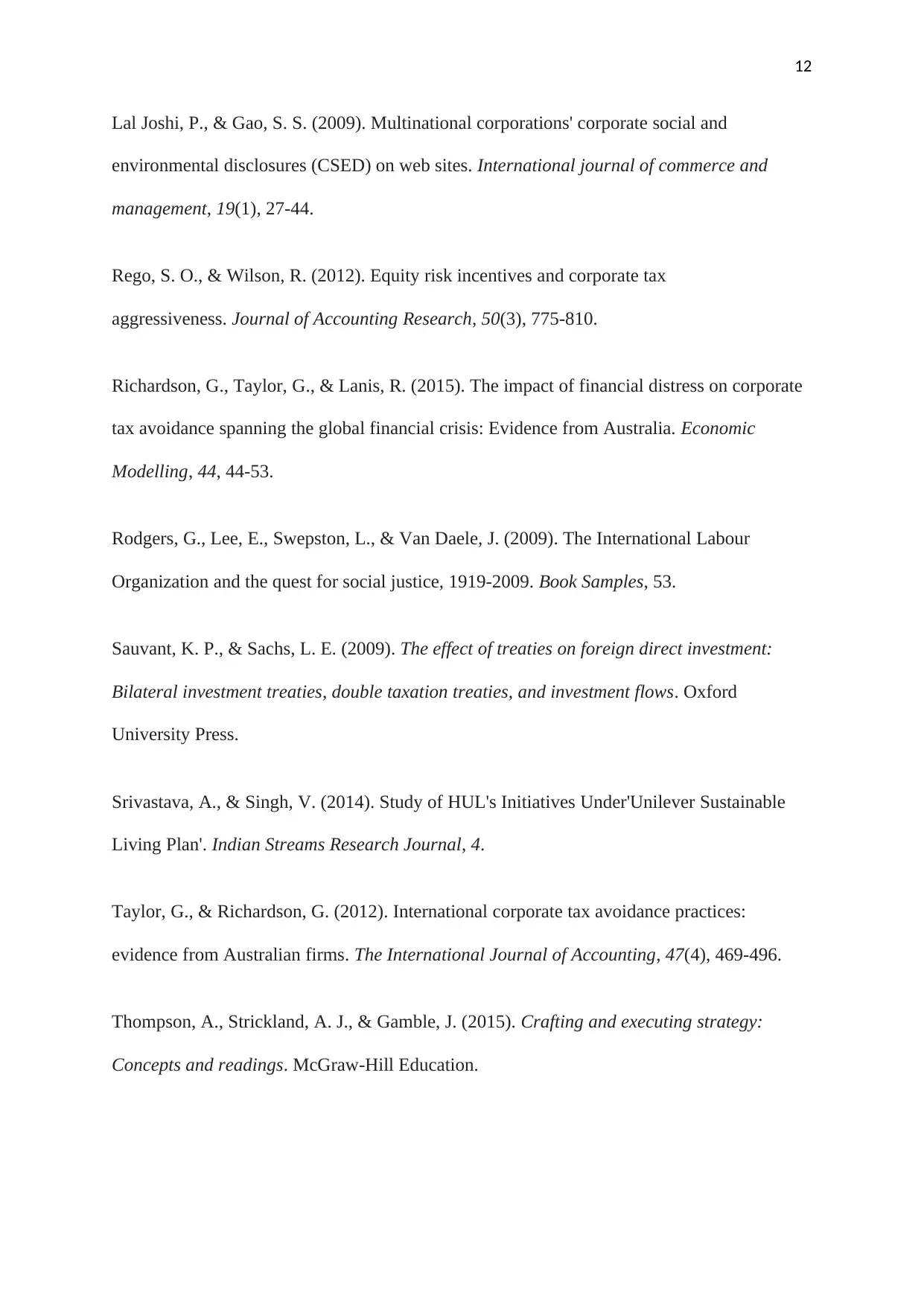
12
Lal Joshi, P., & Gao, S. S. (2009). Multinational corporations' corporate social and
environmental disclosures (CSED) on web sites. International journal of commerce and
management, 19(1), 27-44.
Rego, S. O., & Wilson, R. (2012). Equity risk incentives and corporate tax
aggressiveness. Journal of Accounting Research, 50(3), 775-810.
Richardson, G., Taylor, G., & Lanis, R. (2015). The impact of financial distress on corporate
tax avoidance spanning the global financial crisis: Evidence from Australia. Economic
Modelling, 44, 44-53.
Rodgers, G., Lee, E., Swepston, L., & Van Daele, J. (2009). The International Labour
Organization and the quest for social justice, 1919-2009. Book Samples, 53.
Sauvant, K. P., & Sachs, L. E. (2009). The effect of treaties on foreign direct investment:
Bilateral investment treaties, double taxation treaties, and investment flows. Oxford
University Press.
Srivastava, A., & Singh, V. (2014). Study of HUL's Initiatives Under'Unilever Sustainable
Living Plan'. Indian Streams Research Journal, 4.
Taylor, G., & Richardson, G. (2012). International corporate tax avoidance practices:
evidence from Australian firms. The International Journal of Accounting, 47(4), 469-496.
Thompson, A., Strickland, A. J., & Gamble, J. (2015). Crafting and executing strategy:
Concepts and readings. McGraw-Hill Education.
Lal Joshi, P., & Gao, S. S. (2009). Multinational corporations' corporate social and
environmental disclosures (CSED) on web sites. International journal of commerce and
management, 19(1), 27-44.
Rego, S. O., & Wilson, R. (2012). Equity risk incentives and corporate tax
aggressiveness. Journal of Accounting Research, 50(3), 775-810.
Richardson, G., Taylor, G., & Lanis, R. (2015). The impact of financial distress on corporate
tax avoidance spanning the global financial crisis: Evidence from Australia. Economic
Modelling, 44, 44-53.
Rodgers, G., Lee, E., Swepston, L., & Van Daele, J. (2009). The International Labour
Organization and the quest for social justice, 1919-2009. Book Samples, 53.
Sauvant, K. P., & Sachs, L. E. (2009). The effect of treaties on foreign direct investment:
Bilateral investment treaties, double taxation treaties, and investment flows. Oxford
University Press.
Srivastava, A., & Singh, V. (2014). Study of HUL's Initiatives Under'Unilever Sustainable
Living Plan'. Indian Streams Research Journal, 4.
Taylor, G., & Richardson, G. (2012). International corporate tax avoidance practices:
evidence from Australian firms. The International Journal of Accounting, 47(4), 469-496.
Thompson, A., Strickland, A. J., & Gamble, J. (2015). Crafting and executing strategy:
Concepts and readings. McGraw-Hill Education.
⊘ This is a preview!⊘
Do you want full access?
Subscribe today to unlock all pages.

Trusted by 1+ million students worldwide
1 out of 13
Related Documents
Your All-in-One AI-Powered Toolkit for Academic Success.
+13062052269
info@desklib.com
Available 24*7 on WhatsApp / Email
![[object Object]](/_next/static/media/star-bottom.7253800d.svg)
Unlock your academic potential
Copyright © 2020–2026 A2Z Services. All Rights Reserved. Developed and managed by ZUCOL.





